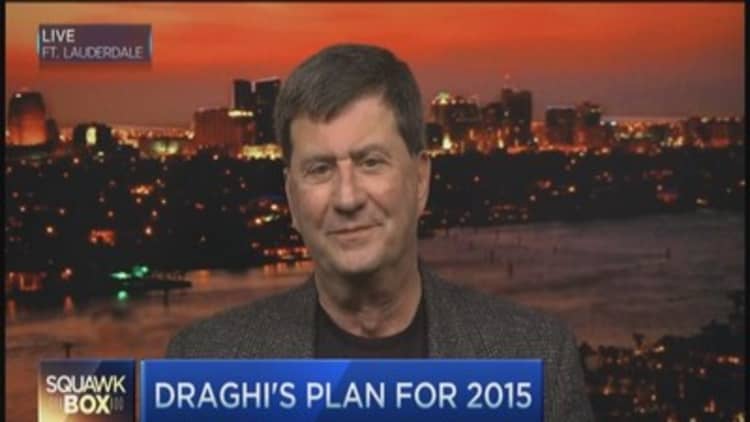
The European Central Bank is widely expected to begin buying the sovereign debt of member countries to stimulate the euro zone economy, but the effects of such quantitative easing would be "negligible," Southwest Securities Managing Director Mark Grant said Monday.
The reason: Most of the borrowing is done on 5-year bonds in Europe, and rates on 5-year sovereign debt in Europe are either negative or just above zero.
"My thought at this point is that the ECB is out of bullets. They don't have anywhere to go. They're facing deflation. I think you're going to see deflationary numbers across the board at the next report in January," Grant told CNBC's "Squawk Box."
Read More Europe gets ready for another Greek drama
On Monday, the euro sank to a nine-year low against the , falling below $1.20, as investors grew increasingly confident the ECB would soon launch a bond-buying program.
The dollar has more room to run up, Steven Wieting, global chief investment strategist at Citi Private Bank, told "Squawk Box." He noted that the U.S. 10-year Treasury yield is currently four times the German yield and there are strong inflows into U.S. bonds from the rest of the world.
He also expects the dollar strengthening will draw global investors into large-cap U.S. equities.
Kathy Lien, managing director of FX Strategy at BK Asset Management, said investors are "pressing the gas" on the euro's slide in the face of week euro zone growth; impending quantitative easing; and the risk of political upset in Greece, Spain, or Portugal this year.
There is a very real possibility the euro hits a minimum of 1.15 by the end of 2015, she said on "Squawk Box."
As to whether the euro experiment will ultimately be a success, Grant said it would probably not be.
Read MoreUK elections worrying you? You're not alone
"I think there are too many warring tribes, if you want to look at it that way, that are in opposition to each other. You just have different mindsets in Italy, Spain, Portugal as compared to Germany," he said.
The odds of a shakeup in euro zone membership "are not zero," said Lou Brien, economic strategist at DRW Trading Group. If one country leaves, it might set up an advantage for early movers, and another member may follow, he said.
Greeks head to the polls on Jan. 25 to vote on a new government. If the anti-austerity party Syriza were to win, it is expected to throw out the terms of the country's bailout program, which could precipitate an exit from the euro zone.
Grant also said he expects a further decline in the U.S. 10-year yield, citing factors such as the relative value of U.S. bonds to those in Europe and Asia, declining oil prices, and a strengthening dollar. He sees yields moving back through 2 percent, down to 1.75 percent and eventually to 1.5 percent.
Read MoreOil hits5½-year lows on supply glut
It is possible that the Federal Reserve will not allow interest rates to rise next year, as the global economic picture deteriorates, he said.
Early last year, Grant predicted 10-year yields would decline from around 3 percent, despite many analysts' expectations for a rise. His call turned out to be correct.


